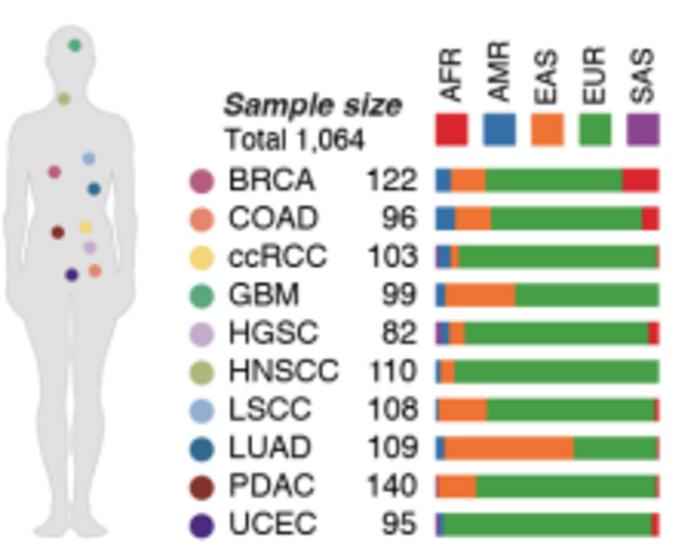A groundbreaking study led by researchers at the Icahn School of Medicine at Mount Sinai, in collaboration with the Clinical Proteomic Tumor Analysis Consortium (CPTAC) funded by the National Cancer Institute, has revealed the significant and complex role that germline genetic variants play in the development and progression of cancer. This multicenter research, published in the online April 14 issue of the prestigious journal Cell, marks a landmark advancement in our understanding of how inherited genetic factors influence tumor biology.
In the context of cancer, the focus has traditionally been on somatic mutations, which are changes that arise in individual cells during a person’s lifetime. However, this new research illuminates an often-overlooked aspect of cancer genetics: the inherited germline variants that an individual carries from birth. These genetic differences are not merely passive bystanders; instead, they actively shape how a person’s cells react to various stimuli, including carcinogenic factors and treatment modalities.
The study utilizes an advanced methodology known as precision peptidomics, which allows researchers to dive deep into the molecular mechanisms by which specific inherited mutations affect the structure and functionality of proteins in cancer cells. By analyzing data from over 1,064 patients across ten distinct cancer types, the researchers have crafted a detailed map of how more than 330,000 protein-coding germline variants operate within the context of cancer biology. This detailed exposition of genetic variance could revolutionize cancer treatment and patient management strategies.
One remarkable outcome of this research is the discovery that germline variants can significantly modify protein activity, gene expression, and even tumor interactions with the immune system. This adds a new layer of complexity to the already intricate dynamics of cancer, highlighting that the effects of inherited variants extend well beyond static genetic templates. As such, the findings suggest that tailoring cancer treatments to not only the mutations present within tumors but also the broader genetic backgrounds of patients could lead to more effective therapies and better patient outcomes.
Dr. Zeynep H. Gümüş, one of the study’s co-corresponding authors and a leading geneticist, emphasized the importance of understanding the active role that inherited genetic differences play in tumor biology. Dr. Gümüş stated, “Our study flips the script by showing that inherited DNA changes can influence how genes are expressed and how proteins—key drivers of cancer behavior—are produced and modified in tumors.” This perspective encourages a paradigm shift where precision medicine encompasses the entirety of an individual’s genetic profile rather than isolating mutations within tumors.
As the study asserts, inherited germline variants outnumber somatic mutations significantly, and their implications have often been overshadowed by a stronger focus on the latter. This research opens new frontiers, suggesting that future cancer care may benefit from a comprehensive approach incorporating both inherited genetics and the tumor’s mutational landscape.
A critical aspect of the findings is the indication that variation in patient responses to cancer therapies may be partially attributed to these inherited genetic differences. This insight could transform how oncologists evaluate treatment plans, leading to more personalized approaches that consider both tumor characteristics and the patient’s genetic predispositions. This revolutionary understanding aims not only for better treatment customization but also for enhanced risk predictions related to cancer development across diverse populations.
However, the researchers caution that while the study offers significant preliminary insights, the primary cohort consisted predominantly of individuals of European ancestry. Therefore, the team emphasizes that extensive further research is necessary to ascertain the generalizability of these findings across multi-ethnic populations. It is vital to ensure that advances in precision medicine do not inadvertently reinforce health disparities, a concern that remains pertinent in the era of personalized medicine.
The ongoing work of the research team extends into two essential avenues: cancer immunotherapy and lung cancer risk prediction. Collaborating with the National Cancer Institute’s Cancer Immune Monitoring and Analysis Centers, the researchers are painstakingly investigating the reasons behind varied patient responses to immunotherapy. This dimension of the research could unveil critical insights into inherited genetic factors influencing therapy effectiveness, potentially paving the way for more precise immunotherapeutic treatments.
Furthermore, the collaboration with the Mount Sinai Million Health Discoveries Program and the Million Veteran Program aims to construct computational models capable of predicting lung cancer risk based on inherited genetic profiles. The implications of these models are far-reaching; they hold the promise of ushering in a new era of proactive healthcare, where targeted early screenings could significantly improve patient outcomes by facilitating early detection and intervention.
In conclusion, the study titled “Precision Proteogenomics Reveals Pan-Cancer Impact of Germline Variants” provides an indispensable contribution to the field of oncology and genetics. By recognizing the importance of inherited genetic variants, this research challenges existing paradigms, pushing the boundaries of personalized medicine and potentially changing the future landscape of cancer care.
The implications of this research go far beyond the laboratory; they touch the lives of millions of patients and their families, offering hope for a future where cancer treatment is as unique as the patient themselves. As healthcare continues to evolve in response to these findings, the potential for alleviating the global cancer burden becomes an exciting frontier for both researchers and clinicians alike.
Subject of Research: Human tissue samples
Article Title: Precision Proteogenomics Reveals Pan-Cancer Impact of Germline Variants
News Publication Date: April 14, 2025
Web References: DOI Article Link
References:
Image Credits: Martins Rodrigues et al., Cell.
Keywords: Cancer, Germline Variants, Precision Medicine, Tumor Biology, Genetic Research.




